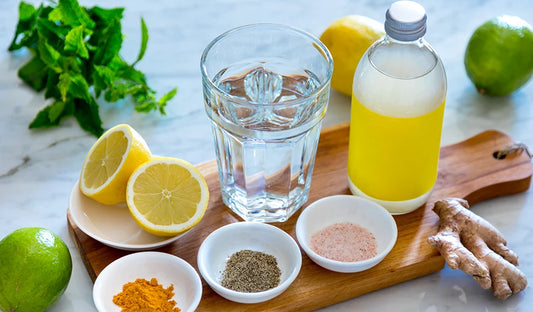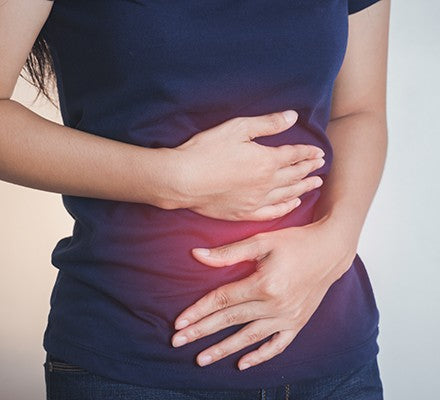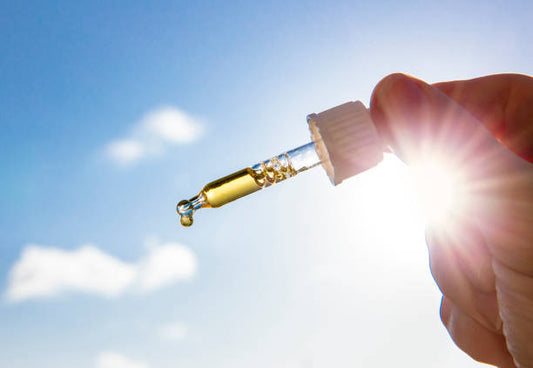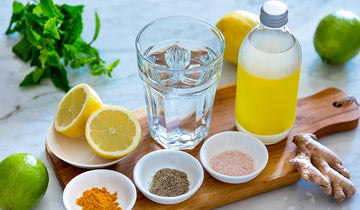Discover Related Products
Now explore supplements designed to support Longevity, Gut Health & Cellular Vitality.
CITOZYM - Support Natural Detox, Immune and Longevity Support
How to Help Reduce Occasional Bloating

Bloating is widespread and impacts nearly everyone at some time. In fact, approximately 25% of generally healthy adults admit they experience occasional bloating. Whether it stems from certain foods you’ve consumed or a particularly large meal, bloating typically leads to discomfort, intermittent gas, worry about your appearance, and sometimes even transient constipation.
What strategies can help ease bloating?
Experiencing occasional bloating isn’t unusual from time to time and usually resolves when you concentrate on improving digestion, addressing constipation, and refining your diet. Often, it’s simply a matter of removing problematic foods from your meal plan. Additionally, specific supplements such as probiotics and digestive enzymes can frequently provide relief as well.
Below, you’ll find numerous actionable suggestions to help you prevent or lessen those bouts of occasional bloating through dietary adjustments and supplements.
What triggers bloating in the gut?
There are various reasons why your abdomen might become distended—for instance, if you’ve been drinking alcohol or carbonated beverages, consuming lots of sugar or ultra-processed products, or even if you suddenly increase your fiber intake in a single day.
Some of the most frequent contributors to bloating include:
- Occasional constipation, which can cause abdominal distension.
- Low consumption of probiotic-rich foods or probiotic supplements, which maintain a healthy balance of gut bacteria in your microbiome. When the ratio between “beneficial” microbes and “potentially harmful” microbes is off-kilter, occasional bloating can ensue.
- Eating oversized meals, especially those that are difficult to break down—such as fried, heavy, sugary, or processed foods.
- Consuming large amounts of fiber, particularly if your digestive system isn’t accustomed to it.
- Food intolerances, like lactose intolerance (difficulty digesting dairy) or gluten sensitivity.
- Inadequate breakdown of sugars and carbohydrates. Certain complex carbohydrate compounds need specific enzymes to be fully digested, yet individuals might lack these enzymes. As a result, some carbs ferment in the gut, producing excess gas.
- Insufficient protein digestion, causing some protein-rich foods to ferment within the gastrointestinal tract.
What exactly occurs in the body when you become bloated?
Bloating is mainly caused by trapped internal gas within your digestive tract. Gas accumulates in the intestines when your body cannot efficiently break down certain foods, or because of normal fluid retention. It doesn’t necessarily indicate fat gain around the midsection, even though it may feel that way.
Excess gas in your intestines is predominantly generated by bacteria and microbes that ferment carbohydrates. Sometimes, specific carbs aren’t absorbed properly and can trigger excessive fermentation, which then releases gas. Therefore, adjusting your diet—particularly by cutting out certain types of carbohydrates—can often help reduce bloating.
7 ways to help reduce occasional bloating
1. Limit your intake of sugar and refined carbs
Why this helps: Refined carbohydrates and added sugars are notoriously difficult for gut bacteria to fully break down. When bacteria ferment these carbs, they aid in producing extra gas, which contributes directly to bloating. Some carbs also tend to ”feed” bloat-fostering bacteria in the gut microbiome, helping to set the stage for an imbalance of microbes.
Salt found in processed foods can also cause water retention, and fat slows down the digestive process overall, contributing to digestive sluggishness and sometimes occasional constipation.
Although it varies by person, because everyone’s gut microbiome is distinct, carbohydrates and sweeteners that often trigger sporadic bloating include lactose, fructose, and the starches found in dairy, wheat, and legumes.
2. Incorporate Probiotic-Rich Foods
Why this helps: A balanced gut microbiome is essential for efficient digestion. When “good” bacteria are outnumbered, undigested food particles can linger and ferment, creating gas. Most modern diets lack to include sufficient probiotics in their meals because of nutrient-poor, highly processed foods and depleted soil.
Consuming probiotic-rich items (or preparing your own fermented products) introduces beneficial bacteria into your digestive system that can outcompete less favorable strains. Probiotics assist in breaking down food and also aid nutrient uptake. You can obtain them by regularly eating easy-to-digest fermented fare—ideally daily—including unsweetened yogurt, kefir, sauerkraut, kombucha, kvass, and kimchi.
3. Eat More Fruits and Vegetables
Why this helps: These provide you with fiber, water, key electrolytes and beneficial enzymes that can help relieve stomach bloating. Try eating more raw or cooked leafy greens, cucumber, fennel, artichoke, melon, berries, steamed veggies like carrots and celery, and cultured/fermented vegetables.
4. Use Herbs and Spices That Soothe Digestion
All-natural gut-calming botanicals like ginger, dandelion, aloe vera, and fennel have been utilized for millennia to ease an occasionally distended abdomen.
Numerous herbs assist the body in expelling surplus fluid, while others—such as ginger and peppermint—can relax the smooth muscles of the gastrointestinal tract, aiding in soothing the digestive system. Consider incorporating freshly crushed herbs (parsley, oregano, rosemary, etc.) and sipping herbal infusions made with mint, ginger, and turmeric.
As always, consult your healthcare professional prior to starting any new dietary or lifestyle regimen, including supplementation.
5. Take supplements that help to reduce occasional bloating
Why this helps: While probiotic foods are beneficial, a high-potency probiotic supplement can deliver consistent strains and a higher colony-forming unit (CFU) count, which supports targeted gut restoration.
For example, our PROBIOTIC P-450 is formulated to help balance the gut flora, support occasional constipation or diarrhea, and reduce gas and bloating for both women and men. Below is a detailed overview:
- Formulation: Contains 13 billion CFU of live active microorganisms that support a healthy gut microbiome.
- Strains: Features two clinically studied probiotic strains—Lactobacillus salivarius and Lactobacillus casei—that survive gastric transit, helping maximize colonization in the intestines. They can help improve the intestinal barrier, reduce inflammation, and help fight pathogens, thus enhancing overall gut health.
- A healthy gut is a cornerstone of a strong immune system. By maintaining a balanced gut microbiome, PROBIOTIC P-450 helps enhance your body's natural defenses against pathogens.
6. Manage Stress—Honor the Gut-Brain Axis
Why this helps: The gut and brain constantly communicate via the vagus nerve and chemical signals. When you’re stressed, elevated cortisol and adrenaline can disrupt normal GI motility, reduce gut blood flow, and alter microbial balance—all of which can support gas retention and bloating.
This means that if your outlook needs a boost, or even if your sleep regimen needs tweaking, are feeling overwhelmed or anxious, you might feel more bloated than usual. Another issue is that stress often leads to poorer food choices, which can lead to occasional bloating.
It’s crucial to prioritize holistic self-care in order to support your digestive health. Make sure you get sufficient sleep, take breaks that help you decompress and relax throughout your day, and engage in activities that bring you joy—such as exercise, spending time in nature, or socializing—which all aid overall well-being.
Here’s another tip: be sure to slow down during meals and practice more mindful eating. Taking your time to eat helps prevent swallowing excess air, minimizes distractions, encourages you to chew food thoroughly, and supports stopping before you’re overly full, all of which help ease digestion.
7. Stay Properly Hydrated and Limit Alcohol
Why this helps: Although it may seem counterintuitive, dehydration often supports bloating. Low fluid intake causes the body to retain water (fluid retention) and can lead to constipation, both of which cause abdominal distension. Alcohol is a diuretic that can deplete electrolytes, so drinking heavily without adequate hydration can sometimes cause bloating.
On top of drinking lots of water, exercising and having herbal teas (such as peppermint, ginger or chamomile) can also help encourage healthy bowel movements and decrease bloating.
Conclusion
By systematically implementing these strategies—particularly limiting refined carbs, prioritizing probiotics (including PROBIOTIC P-450), and addressing lifestyle factors—you can significantly help reduce the frequency and severity of occasional bloating and keep your digestive system functioning at its best.







No comments